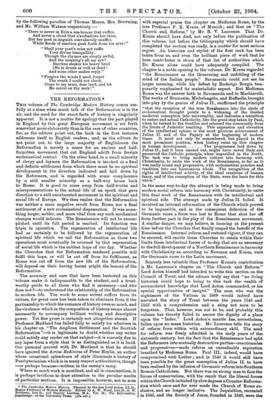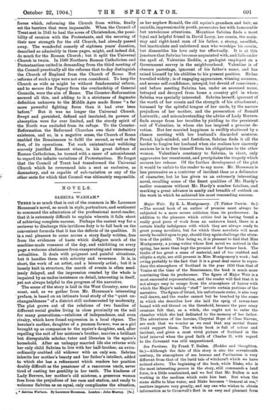Tars volume of The Cambridge Modern History comes use- fully
at a time when much talk of the Reformation is in the air, and the need for the exact facts of history is singularly apparent. It is not a matter for apology that the part played in England by this great European movement is set forth somewhat more elaborately than in the case of other countries, for, as the editors point out, the book in the first instance addresses itself to English readers ; and, as the editors do not point out, to the large majority of Englishmen the Reformation is merely a name for an ancient and half- forgotten movement that cut England adrift from foreign ecclesiastical control. On the other hand, to a small minority of clergy and laymen the Reformation is invoked as a final and definite settlement from which there must be no spiritual development in the direction indicated and laid down by the Reformers, and is regarded with some complacence by a still smaller minority as a half-way house back to Rome. It is good to come away from half-truths and misrepresentations to the actual life of an epoch that gave direction to a still unexhausted movement in the spiritual and social life of Europe. We then realise that the Reformation was neither a mere negative revolt from Rome, nor a final settlement of a new ecclesiastical dispensation. It was some- thing larger, nobler, and more vital than any such mechanical changes would indicate. The Renaissance will not be accom- plished until its full period is reached. Its function was triple in operation. The regeneration of intellectual life had as certainly to be followed by the regeneration of spiritual life which we call the Reformation as those two operations must eventually be crowned by that regeneration of social life which is the noblest hope of our day. Whether the Churches that the Reformation rendered possible will - fulfil this hope, or will be cut off from its fulfilment, as Rome was cut off from the new life of the Reformation, will depend -on their having learnt aright the lessons of the Reformation.
The accuracy and care that have been bestowed on this 'volume make it indispensable to the student, and a trust- worthy guide to all those who find it necessary—and who does not P—to understand the relationship of the Reformation to modern life. The work to some extent suffers from its virtues, for great care has been taken to eliminate from it the partisanship to which the romance of history owes so much, and the virulence which in the composition of history seems almost necessarily to accompany brilliant writing and descriptive power. Yet fine prose is certainly not altogether absent. If Professor Maitland has failed fully to satisfy his admirers in his chapter on " The Anglican Settlement and the Scottish Reformation "—it is legitimate to doubt whether any writer could satisfy any reader on that subject—it is scarcely due to any lapse from a style that is as distinguished as it is lucid. Our personal quarrel with Dr. Maitland is that he should have ignored the Aerius R,edivirous of Peter Heylin, an author whose occasional splendours of style illuminate a history of Presbyterianism which is in many respect authoritative, though —or perhaps because—written in the enemy's camp.
Where so much work is excellent, and all is conscientious, it is perhaps invidious to draw attention to the peculiar merits of particular sections. It is impossible, however, not to note
• The Cambridge Modern History. Planned by the late Lord Acton, LL.D., Begins Professor of Modern History. Edited by A. W. Ward, Litt.D., G. W. Prothero, Litt.D., and Stanley Leather, M.A. Vol. H., The Reformation. _Cambridge : at the University Preis, [16s. net.]
Church and, Reform," by Mr. R. V. Laurence. That Dr. Kraus should have died, not only before the publication of this volume, but before the bibliography which should have completed the section was ready, is a matter for most serious regret. An historian and stylist of the first rank has been taken from us, and even the brilliant piece of work that he here contributes is shorn of that list of authorities which Di'. Kraus alone could have adequately compiled. The chapter is a noble opening to the volume. Dr. Kraus regarded " the Renaissance as the blossoming and unfolding of the mind of the Italian people." Savonarola could not see its larger meaning, while his defeat by Roderigo Borgia tem- porarily emphasised its materialistic aspect. But Medicean Rome was the answer both to Savonarola and to Machiavelli. The works of Bramante, Michelangelo, and Raffaelle, brought into play by the genius of Julius II., reaffirmed the principle "that the- reception of the true Renaissance into the circle of ecclesiastical thought points to a widening of the limited medieval conception into universality, and indicates a transition. to entire and actual Catholicity, like the great step taken by Paul,. when be turned to the Gentiles and released the community from the limits of Judaistic teaching. This expansion and elevation of the intellectual sphere is the most glorious achievement of Julius II. and of the Papacy at the beginning of modern times. It must not only be remembered, but placed in the most prominent position, when history sums up this chapter in human development The programme laid down by Julius II., had it been carried out, might have saved Italy and_ preserved the Catholic principle, when imperilled in the North. The task was to bring modern culture into harmony with Christianity, to unite the work of the Renaissance, so far as it was really sound and progressive, with ecclesiastical practice and tradition into one harmonious whole. The recognition of the rights of intellectual activity, of the ideal creations of human fancy, and of the conception of the State, were the basis for this union."
In the same way to-day the attempt is being made to bring modern social reform into harmony with Christianity, to unite this final work of the Renaissance with its intellectual and spiritual side. The attempt made by Julius II. failed. It involved an internal reformation of the Church which proved to be impossible, and in the consequent defection of the Germanic races a force was lost to Rome that shut her off from further part in the play of the Renaissance movement. A similar danger, we may believe, is looming at the present. time before the Churches that finally reaped the benefit of the Renaissance. Internal reform and restored vigour, if they can be secured, will enable these Churches to retain within their limits those intellectual forces of to-day that are as necessary to the full development of a Northern Renaissance in harmony with Christianity as, according to Newman and Kraus, were the Germanic races to the Latin movement.
Scarcely less valuable than Professor Kraus's contribution is Mr. Laurence's chapter on " The Church and Reform." Lord Acton himself had intended to write this section on the Council of Trent, and the editors truly say that "no living historian could hope to bring to this task the wealth of accumulated knowledge that Lord Acton commanded, or his special opportunities of insight." The man who was the nightmare of the Vatican in 1869 would indeed have narrated the story of Trent between the years 1545 and 1563 with a comprehension and a sting not soon to be forgotten. That, however, was not to be, and probably this volume has thereby failed to secure the dignity of a place upon the " Index." Lord Acton's mantle has, nevertheless, fallen upon no mean historian. Mr. Laurence tells the story of reform from within with extraordinary skill. The need for reform was freely admitted in the early years of the sixteenth century, but the fact that the Renaissance had split the Reformers into mutually destructive parties—reactionaries and progressives—made reform an unrealisable aspiration
breathed by Medicean Rome. Paul III., indeed, would have compromised with Luther ; and in 1540 it would still have been possible for the great conception of Julius IL to have
been realised by the infusion of Germanic reform into Southern Roman Catholicism. But there was no strong man to face the forces of conservatism, with the result that the liberal forces within the Church initiated by slow degrees a Counter-Reforma- tion which once and for ever made the Church of Rome ex- clusive, and no longer inclusive. The Inquisition, recreated in 1542, and the Society' of Jesus, founded in 1540, were the forces which, reforming the Church from within, finally set the barriers that were impassable. When the Council of Trent met in 1545 to heal the sores of Christendom, the possi- bility of reunion with the Protestants, and the securing of their new strength for the old Church, had already passed away. The wonderful comedy of eighteen years' duration, described so admirably in these pages, might, and indeed did, do much for the Roman Church ; but it split the Universal - Church in twain. In 1560 Northern Roman Catholicism and Protestantism united in demanding from the third meeting of the Council practically all the reforms that to-day distinguish the Church of England from the Church of Rome. But reforms of such a type were not even considered. To keep the Church as wide as might be without fundamental reform, and to secure the Papacy from the overlordship of General Councils, were the aim of Rome. The Counter-Reformation secured all this, and adding to it a strictness of dogmatic definition unknown to the Middle Ages made Rome " a far more powerful fighting force than it had ever been before." But it was no longer the Universal Church. Swept and garnished, defined and insulated, its powers of absorption were for ever limited, and the sturdy spirit of the North was excluded from its refuge. To the Counter- Reformation the Reformed Churches owe their definitive existence, and so, in a negative sense, the Church of Rome enabled the Renaissance to fulfil the second, as well as the first, of its operations. Yet such unintentional welldoing scarcely justified Bossuet when, in his great defence of Roman Catholicism, he turned with a sneer of astonishment to regard the infinite variations of Protestantism. He forgot that the Council of Trent had transformed the Universal Church which he reverenced into a sect as exclusive, as damnatory, and as capable of sub-variation as any of the other sects for which that Council was ultimately responsible.
NOVELS.











































 Previous page
Previous page